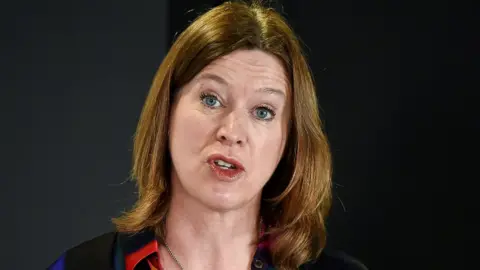Scotland not fully part of Covid talks, inquiry told
 PA Media
PA MediaScotland's communication with scientific experts in London during the pandemic were hampered by poor technology, the country's former chief medical officer has said.
Dr Catherine Calderwood said the quality of lines for conference calls was very poor.
This meant that Scotland was not fully part of important meetings, she added.
Dr Calderwood was giving evidence to the UK Covid Inquiry in London.
She resigned as chief medical officer in April 2020 - two weeks after the UK-wide lockdown was imposed on 23 March.
Dr Calderwood had been given a police warning for breaking the rules by making two trips to her second home in Earlsferry in Fife with her family, more than an hour's drive from her main home in Edinburgh.
The chief medical officer had fronted TV and radio adverts urging the public to stay at home to save lives and protect the NHS.
She also took part in daily televised media briefings alongside Nicola Sturgeon.
Giving evidence to the inquiry via a video link, she said that communication with the Scientific Advisory Group for Emergencies (Sage) committee in London had been very good before the pandemic.
But this changed when the virus hit, with Dr Calderwood saying that dialling into the remote meetings from Scotland "became much more difficult because that was based in London and Scotland was not fully part of that".
She added: "There were a large number of people dialled into meetings and of course our infrastructure for remote working was nothing like it is now.
"I would have attended or my deputy attended with several other people from Scotland, but very often the quality of the line was poor.
"It dropped out very frequently and there was often not really a fully fluent readout from some of those very important meetings in the early days of the pandemic."
 UK Covid-19 Inquiry/YouTube
UK Covid-19 Inquiry/YouTubeDr Calderwood said this was partly the reason for Scotland establishing its own version of Sage - the Covid-19 Advisory Group - in March 2020.
She said she was keen for the group to include members who had been critical of how the pandemic had been handled up to that point to ensure there was "lively scientific debate".
Dr Calderwood also said the UK failed to learn from countries which had previously dealt with coronaviruses similar to Covid such as Sars and Mers.
She added: "We were late and slow. There wasn't a formal or coordinated way to communicate with other countries and we could have learned more rapidly".
Dr Calderwood said some recommendations from an exercise in 2018 looking at how Scotland might respond to a coronavirus outbreak had not been implemented ahead of the pandemic, including guidance on the use and distribution of safety equipment PPE, and the fitting of FFP3 masks.
And she said staff shortages in Scotland's NHS were making it "extremely, extremely difficult" to plan for a future pandemic as workers were not able to be freed up to attend exercises.
Dr Calderwood is now the national clinical director of the Centre for Sustainable Delivery at the Golden Jubilee hospital in Clydebank.
She was previously a consultant obstetrician and gynaecologist.
She had initially been expected to give evidence to the inquiry last week but the session was rescheduled without explanation shortly before it was due to start.
 Reuters
ReutersThe Covid inquiry was set up to examine the UK's response to the virus, and will also look into the impact of the pandemic and the lessons that can be learned for future virus outbreaks.
Public hearings are expected to continue until 2026.
A separate Scottish inquiry that will look specifically at the impact of the virus north of the border has been hit by delays after its original chairwoman quit for personal reasons and four members of the inquiry's legal team also stood down.
Ms Sturgeon and her deputy at the time, John Swinney, both appeared in person at the inquiry last week.
Jeane Freeman, who was Scotland's health secretary during the pandemic, gave evidence remotely - but her session was repeatedly disrupted due to a poor internet connection.
About 227,000 people died in the UK with Covid listed as one of the causes on their death certificate - including more than 17,000 in Scotland - after the first cases were detected early in 2020.
More than 44 million people were estimated to have caught the virus by February 2022.
What is the Covid inquiry?
- It is about going through what happened and learning lessons
- No-one will be found guilty or innocent
- Any recommendations made do not have to be adopted by governments
- The inquiry has no formal deadline but is due to hold public hearings until 2026
- Scotland is holding a separate inquiry in addition to the wider UK one
